Psych
Antidepressant
SSRI

expreSS tRIps: selective serotonin reuptake inhibitors (SSRIs)
Fly out: fluoxetine (SSRI)
Parrot: paroxetine (SSRI)
Desert Airline: sertraline (SSRI)
City: citalopram (SSRI)
Smiley face: serotonin (5-HT)
Keeping post-it out of the drawer: SSRIs inhibit the presynaptic reuptake of serotonin (5-HT)
Fax machine: venlafaxine (SNRI)
Dual copier/scanner: duloxetine (SNRI)
North and South: SNRIs (e.g. venlafaxine, duloxetine) inhibit the presynaptic reuptake of norepinephrine and serotonin
2 month calendar: SSRIs and SNRIs (take 1-2 months to achieve maximum effect (not for acute treatment)

Happy and sad masks: SSRIs and SNRIs are first line agents for the treatment of depression
5H-TV: serotonin (5-hydroxytryptamine, 5-HT). SSRI and SNRI treat depression by increase serotonin
Anxious coworker: SSRIs and SNRIs are first line agents for the treatment of generalized anxiety disorder (GAD)
The Scream: SSRIs and SNRIs treat panic disorder
Dog tags: SSRIs and SNRIs treat PTSD
Obsessively neat: SSRIs are useful in the management of obsessive compulsive disorder (OCD)
Binge drawer: SSRIs are useful in the management of bulimia, not anorexia
Shy guy: SSRIs are useful in the management of social anxiety disorder
Chronically frayed wire: SNRIs treat chronic pain (e.g. neuropathic pain)
Pain in the Diasweetes machine: SNRIs (e.g. venlafaxine, duloxetine) treat diabetic neuropathy (both NE and 5HT)
Fiber bars: SNRIs (e.g. venlafaxine, duloxetine) treat fibromyalgia

Inappropriately wet head: SSRIs may cause hyponatremia (SIADH)
Rejected advances: SSRIs can cause sexual dysfunction
Fat belly: SSRIs can cause weight gain
Sleeping on the job: SSRIs can cause drowsiness
Excessive smiley faces: SSRIs and SNRIs can serotonin syndrome
Hot and hypertensive: serotonin syndrome is characterized by hyperthermia and hypertension (autonomic instability)
Hyperactive foot tap: serotonin syndrome is characterized by neuromuscular hyperactivity (e.g. hyperreflexia, clonus) NMS: rigidity
Tricycle and mouse traps: serotonin syndrome can occur if SSRIs or SNRIs are combined with other drugs that increase serotonin levels (e.g. TCAs, MAO inhibitors)
“Silly pranks prohibited”: cyproheptadine (5HT-2 blocker) treats serotonin syndrome
Hypertensive coworker: SNRIs can cause hypertension
Withdrawn with the flu: withdrawal symptoms from SSRIs and SNRIs include flu-like symptoms (dizziness, fatigue, headache, nausea), taper off the drug
TCA
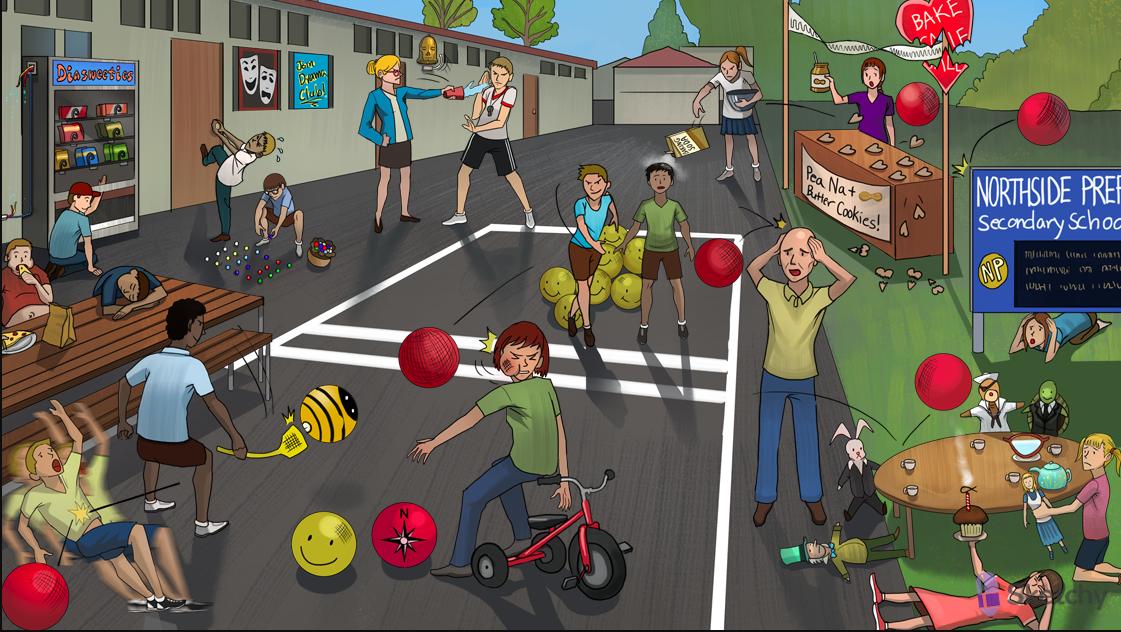
Tricycle: tricyclic antidepressants (TCAs)
Imprint: imipramine (and derivatives desipramine, clomipramine - TCAs)
Tripping: amitriptyline, nortriptyline
Prevented from picking up smiley face and compass balls: TCAs inhibit presynaptic uptake of serotonin and norepinephrine (NET, SERT)
Treat depression by up monoamines (S, D, NE)

Happy and sad masks: TCAs can be useful in treatment resistant depression (SSRI first line)
Resistant door: TCAs can be useful in treatment resistant depression (SSRI first line)
Pain from Diasweeties machine: TCAs treat diabetic neuropathy
Chronically frayed wire: TCAs treat chronic pain (e.g. neuropathic pain)
Pounding head bell: TCAs can be used for migraine prophylaxis (amitryptyline)
Obsessively neat: clomipramine (TCA) treats OCD (SSRIs first line)

Northside Prep: nortriptyline and desipramine (secondary amines)
Protected by secondary sign: secondary amines (e.g. nortriptyline and desipramine) are associated with less cholinergic effects (good for elderly)

Rejected advances: TCAs can cause sexual dysfunction
Anti-muscarinic tea party: TCAs inhibit muscarinic acetylcholine receptors → dry mouth, constipation, blurred vision, urinary retention
Confused elderly: TCAs are relatively contraindicated in elderly patients due to severe anticholinergic and antihistamine effects (use secondary amines)
Bee swatter: TCAs block H1 histamine receptors
Hefty kid: TCAs can cause increased appetite and weight gain
Sleeping kid: TCAs can cause sedation
Extinguished alpha flame: TCAs block alpha-1 receptors
Passed out: TCAs can cause orthostatic hypotension
Broken hearts: TCAs induced cardiotoxicity (e.g. fatal cardiac arrhythmias) is the most common cause of death in overdose
Inactivated peanut butter jar: TCAs block the cardiac fast Na+ channels, decreased contractility, QRS, QT propagation
Wide QRS crack: TCAs can widen the QRS complex on ECG
Twisted torsades streamer: TCAs can induce torsades
Baking soda: sodium bicarb teats widened QRS and ventricular arrhythmia caused by TCA overdose (increase serum pH, favor nonionized drug version, also increase Na in serum)
Shaking kid: TCAs can induce seizures (cardiac, coma, convulsion)
Stack of smiley faces: TCAs can cause serotonin syndrome
MAO I

Albino mouse: monoamine oxidase A (MAO-A)
Albino mouse eating smiley face: MAO-A breaks down serotonin
Albino mouse eating north compass: MAO-A breaks down norepinephrine
Albino mouse eating rope: MAO-A breaks down dopamine
Black mouse: MAO-B
Black mouse eating rope: MAO-B breaks down dopamine

Mouse trap: MAO inhibitors
Irreversible trap: MAO inhibitors are irreversible
“Try a sip of wine”: tranylcypromine (MAO inhibitor)
Funnel: phenelzine (MAO inhibitor)
Boxed wine: isocarboxazid (MAO inhibitor)
Sledge hammer: selegiline (selective MAO-B inhibitor)
Brain tied with rope: selegiline (selective MAO-B inhibitor) increases dopamine levels in the CNS

Happy and sad masks: MAO inhibitors can treat depression (not first line)
“Not typical”: MAO inhibitors may be useful in atypical depression
Resistant wine bottle: MAO inhibitors can be useful in treatment resistant depression
Cog wheels: selegiline is useful in the management of Parkinson's disease (increases dopamine levels in the CNS)

Aged meats, wine, cheese: MAO inhibitors should be avoided with these tyramine
containing foods
Albino mouse eating GI meat: tyramine is normally broken down by MAO-A in the GI tract
Trap releasing north compass cheeses: in the presence of MAO inhibitors, tyramine enters the circulation and acts as a sympathomimetic agent
Hypertensive and sweaty: tyramine toxicity can precipitate a hypertensive crisis (e.g. hypertension, blurry vision, diaphoresis)
Also blocks H1, a1: orthostatic hypotension, weight gain
Pile of smiley faces: MAO inhibitors can cause serotonin syndrome
Tricycle: MAO inhibitors should be avoided with other drugs that increase serotonin levels
(e.g. TCAs, SSRIs, SNRIs → cause serotonin syndrome)
Phantom of the alpha: phentolamine (alpha-1 and alpha-2 blocker) can be used to manage
hypertensive symptoms of tyramine toxicity
Bupropion

“NET DAT ball”: bupropion inhibits the norepinephrine transporter (NET) and the dopamine transporter (DAT) (work like amphetamines). No effect on serotonin
Pro ball player: bupropion (atypical antidepressant)
Aroused from sleep: bupropion exerts CNS activating effects
Happy and sad masks: atypical antidepressants can be used as first line agents to treat depression
“Pros don’t smoke”: bupropion can be used to treat tobacco dependence
Shaking: bupropion can induce seizures, avoid in seizure patients
Shaking binge snacker: bupropion is contraindicated in bulimia (may induce seizures)
Shaking skinny player: bupropion is contraindicated in anorexia nervosa (may induce seizures)
Kissing couple: bupropion does not cause sexual dysfunction
“Lose weight”: bupropion is less likely to cause weight gain

“Mirth and Misery”: mirtazapine (atypical antidepressant)
Happy and sad masks: atypical antidepressants can be used as first line agents to treat depression
Extinguished double alpha light: mirtazapine blocks alpha-2 receptors
Released smiley faces and north compasses: alpha-2 inhibition increases presynaptic release of serotonin and norepinephrine
Retired 52 and 53: mirtazapine blocks 5HT-2 and 5HT-3 receptors
Bee swatter: mirtazapine inhibits H1 histamine receptors
Sleeping fan: mirtazapine can cause sedation
Hefty fan: mirtazapine can cause weight gain
Kissing couple: mirtazapine does not cause sexual dysfunction

Trombone: trazodone (serotonin modulator)
Smiley face drummer: trazodone is a serotonin modulator (antagonizes 5-HT receptors and inhibits 5-HT reuptake)
Retired 52: trazodone inhibits 5HT-2 receptors
Happy and sad masks: atypical antidepressants can be used as first line agents to treat depression
Extinguished alpha lighter: trazodone antagonizes alpha-1 receptors
Erect trombone: trazodone can cause priapism (trazobone)
Fainting: trazodone can cause orthostatic hypotension
Sleeping players: trazodone can cause sedation
Bee swatter: trazodone blocks H1 histamine receptors
Rejected advances: trazodone can cause sexual dysfunction
Pile of smiley faces: trazodone can cause serotonin syndrome
Mood Stabilizers
Lithium
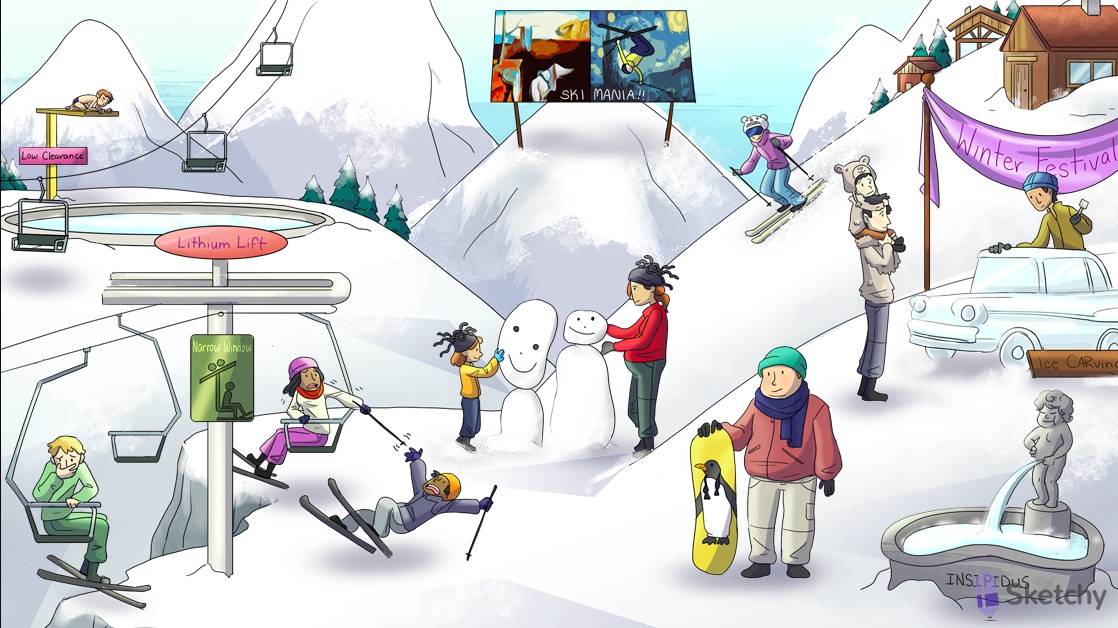
Polar setting: bipolar
2 Stabilizing poles: mood stabilizers (e.g. lithium, valproate, carbamazepine, lamotrigine, antipsychotics)
“Winter festiVAL”: valproate treats bipolar disorder (acute mania and maintenance)
Classic car carving: carbamazepine treats bipolar disorder (acute mania and maintenance)
Llama: lamotrigine treats bipolar disorder (maintenance only)
Psychotic painting on the high peak: first generation (e.g. haloperidol) and second generation (e.g. quetiapine) antipsychotics treat acute mania

Stabilizing chair lift: lithium treats bipolar disorder (acute mania and maintenance)
Narrow window: lithium has a very narrow therapeutic index
Early nausea: acute lithium toxicity causes GI symptoms (e.g. nausea, vomiting, diarrhea)
Late trembling: chronic lithium toxicity causes neurologic symptoms (e.g. tremor)
Late falling: chronic lithium toxicity causes neurologic symptoms (e.g. ataxia, confusion)
Undone bowtie: lithium therapy can cause hypothyroid
Hefty snowboarder: signs of lithium induced hypothyroidism include weight gain, dry skin, hair loss, and constipation
Insipidus fountain: lithium can cause nephrogenic diabetes insipidus
Tarantula hat: lithium is teratogenic (Ebstein’s anomaly)
Large right head: atrialization of the right ventricle (seen in Ebstein’s anomaly with ASD and malformed tricuspid (regurge))

Thighs on high dive: thiazide diuretics (increase lithium levels)
“Low clearance”: diuretics (e.g. thiazides) and NSAIDs decrease clearance of lithium (decrease GFR)
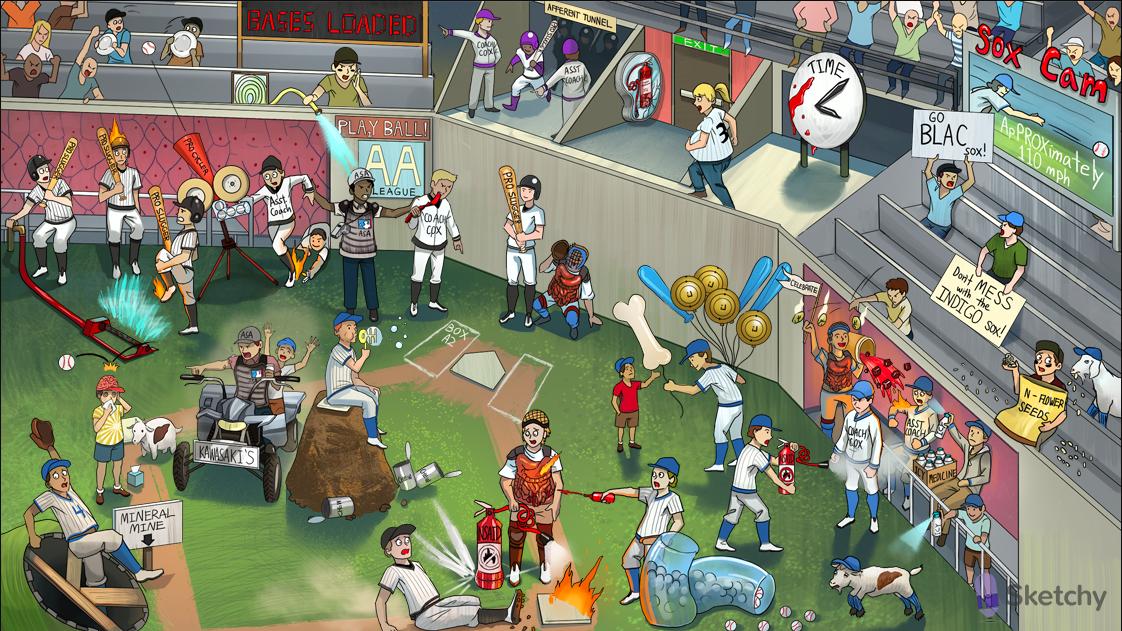
Elevated “lift-ium” balloons: NSAIDs can increase serum lithium concentrations
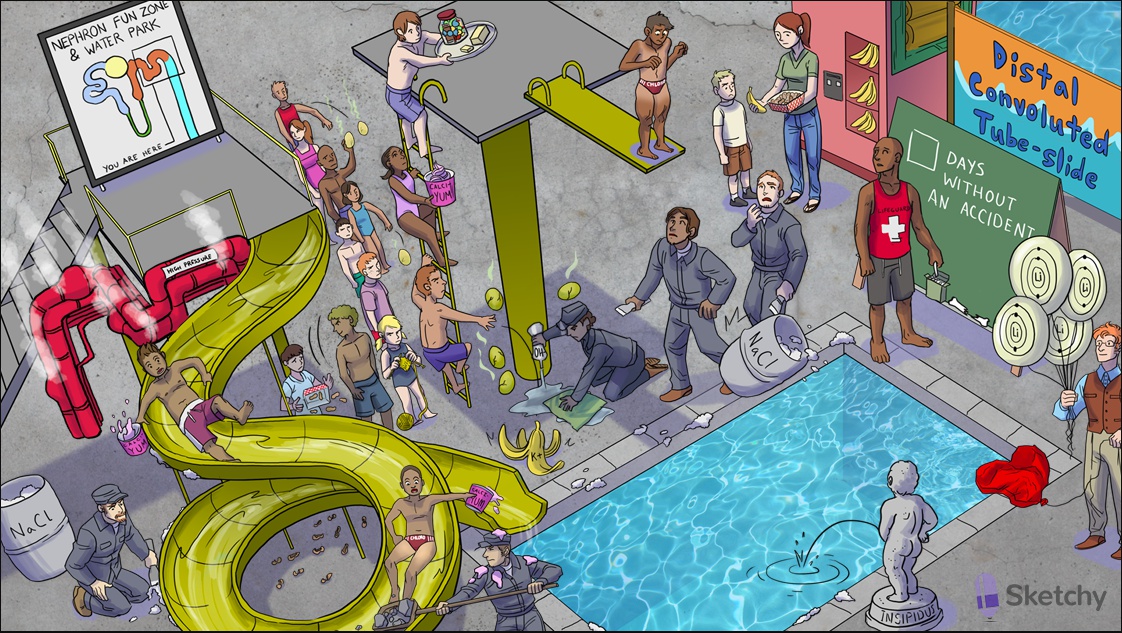
"Lift"ium balloons: thiazide diuretics can cause increased lithium levels (bipolar disorder treatment)

Falling lift-ium balloon man: amiloride treats lithium induced DI (blocks Li+ entry into collecting duct cells → increased Li+ clearance)
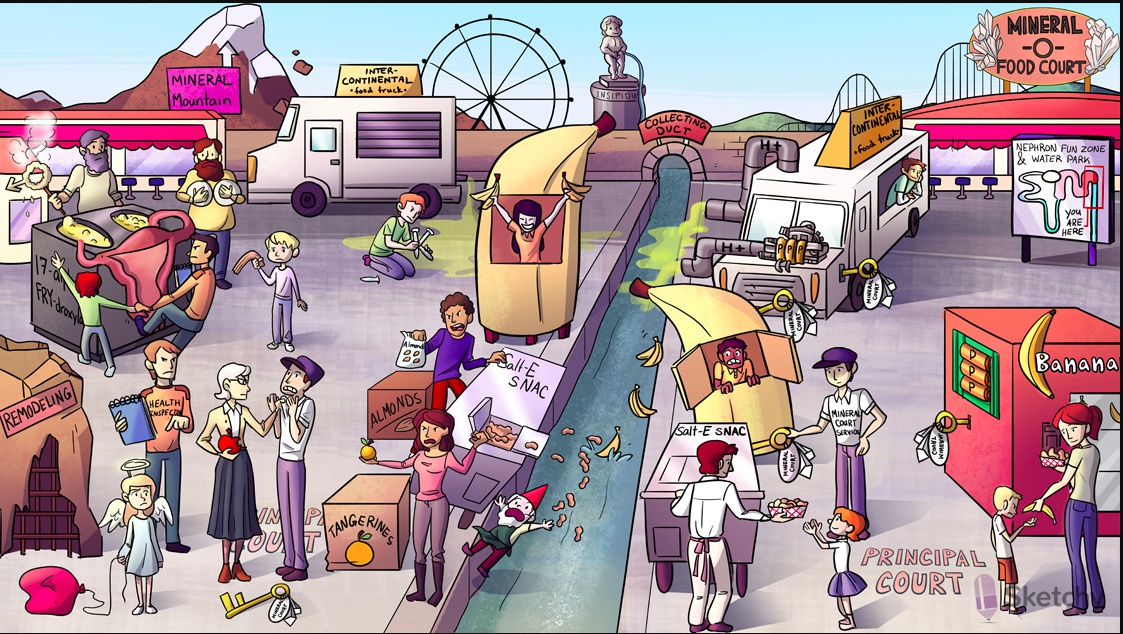
insipidus fountain: amiloride is useful in the treatment of Li+ induced nephrogenic diabetes insipidus, block Li reabsorption
Valproate
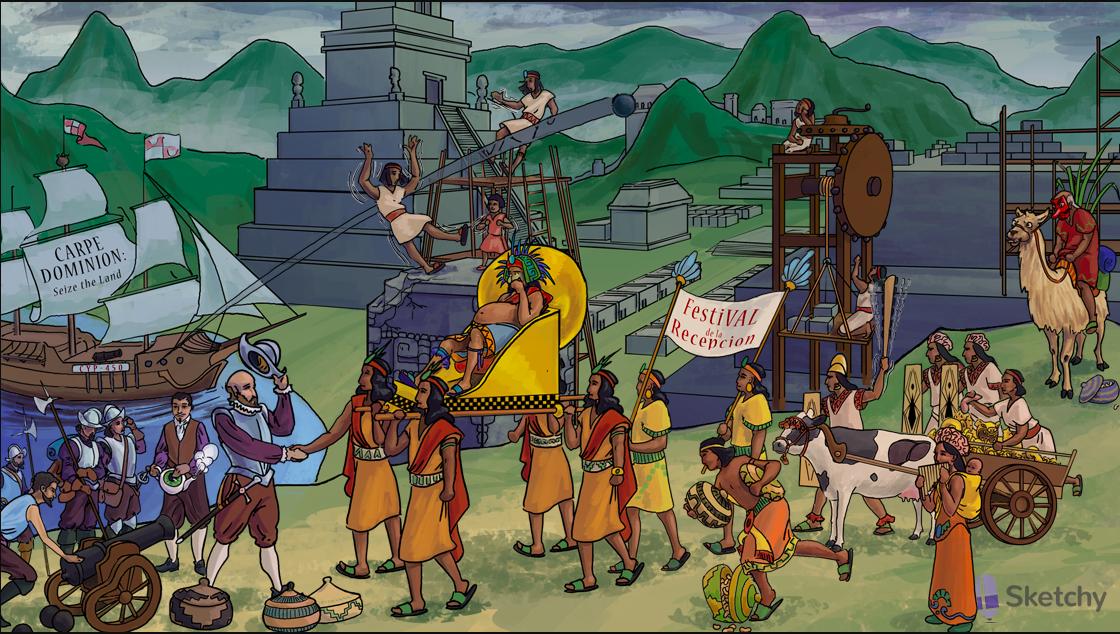
“Seize the land”: broad spectrum antiepileptic agents (e.g. valproate, topiramate, lamotrigine, levetiracetam)
Welcome festiVAL: valproate (broad spectrum anti epileptic drug)
Toupee: topiramate (broad spectrum antiepileptic drug)
Llama: lamotrigine (broad spectrum antiepileptic drug
Elevator: levetiracetam (broad spectrum antiepileptic drug)
Focal arm shaking: broad spectrum antiepileptic agents (e.g. valproate) treat focal seizures
Generalized body shaking: broad spectrum antiepileptic agents (e.g. valproate) treat generalized seizures
Juvenile shaking arms: broad spectrum antiepileptic agents (e.g. valproate) treat juvenile myoclonic epilepsy (a type of generalized seizure disorder)
Chrome CYP450 cannon: many antiepileptic drugs are metabolized by the hepatic cytochrome P450 system

Welcome festiVAL: valproate (broad spectrum anti epileptic drug)
Inactivated baskets of salty peanuts: valproate increases Na+ channel inactivation
Elevated cab design: valproate increases GABA levels in the CNS
Nauseated: valproate can cause GI distress (e.g. nausea, vomiting)
Fat belly: valproate can cause increased appetite and weight gain
Trembling weapon: valproate can cause tremor
Liver spot: valproate can cause fatal hepatotoxicity
Squeezed pancreas sponge: valproate can cause pancreatitis
Tarantula: valproate is teratogenic
Tubes: valproate therapy during pregnancy can cause neural tube defects (e.g. spina bifida)
Bald head: Alopecia (valopecia)

Toupee: topiramate (broad spectrum antiepileptic drug)
Inactivated baskets of salty peanuts: topiramate increases Na+ channel inactivation
Binding to cab driver: topiramate directly, allosterically binds to the GABA-A receptor
Fatigued soldiers: topiramate can cause somnolence and fatigue
Scratching head: topiramate can cause confusion and cognitive slowing
Thin arm: topiramate can cause weight loss
Kidney cannon and cannon balls: topiramate can cause urolithiasis (kidney stones)
High pressure eye kettle: topiramate can cause acute angle closure glaucoma

Llama: lamotrigine (broad spectrum antiepileptic drug
Inactivated baskets of salty peanuts: lamotrigine increases Na+ channel inactivation
Sloughed off red mask: lamotrigine can cause Stevens-Johnson syndrome (SJS/TEN)
Cross-eyed: lamotrigine can cause diplopia

Elevator: levetiracetam (broad spectrum antiepileptic drug)
Sleeping on the job: levetiracetam can cause somnolence
levetiracetam acts downstream by disrupting vesicle fusion
Carbamazepine

“Seize the Night”: narrow spectrum antiepileptic agents (e.g. carbamazepine, phenytoin, phenobarbital, gabapentin)
Classic car: carbamazepine (narrow spectrum antiepileptic drug)
Classic tow truck: phenytoin (narrow spectrum antiepileptic drug)
“Grab a pint”: gabapentin (narrow spectrum antiepileptic drug)
Focal arm shaking: narrow spectrum antiepileptic agents (e.g. carbamazepine, phenytoin) treat focal seizures (and generalized tonic-clonic), can sometimes exacerbate other seizures like JME

Classic car: carbamazepine (narrow spectrum antiepileptic drug)
Inactivated salty sodium chip bags: carbamazepine increases Na+ channel inactivation
Focal arm shaking: narrow spectrum antiepileptic agents (e.g. carbamazepine, phenytoin) treat focal seizures (and generalized tonic-clonic), can sometimes exacerbate other seizures like JME
Three gems: carbamazepine is a first line therapy for trigeminal neuralgia
Unbalanced stack: carbamazepine can cause ataxia (esp for elderly)
Misaligned headlights: carbamazepine can cause diplopia
Inappropriate wet head: carbamazepine can cause syndrome of inappropriate ADH (SIADH)
Sand timer: carbamazepine can cause agranulocytosis
Activated chrome bumper: carbamazepine induces cytochrome P450
Eosinophilic dress: carbamazepine can cause drug reaction with eosinophilia and systemic symptoms (DRESS) syndrome
Tarantula: carbamazepine is teratogenic
Neural exhaust tube: carbamazepine therapy during pregnancy can cause neural tube defects (e.g. spina bifida)
Sloughed off red mask asian: carbamazepine can cause Stevens-Johnson syndrome (SJS/TEN), HLA B1502 allele, Asians

Classic tow truck: phenytoin (narrow spectrum antiepileptic drug)
Inactivated salty sodium chip bags: phenytoin increases Na+ channel inactivation
Focal arm shaking: narrow spectrum antiepileptic agents (e.g. carbamazepine, phenytoin) treat focal seizures (and generalized tonic-clonic), can sometimes exacerbate other seizures like JME
“Status”: status epilepticus (treat acutely with benzodiazepines and phenytoin for maintenance
Unbalanced stack: phenytoin can cause ataxia
Misaligned headlights: phenytoin can cause diplopia
Spilled salad: phenytoin can cause folate deficiency → megaloblastic anemia
Expanding gum: phenytoin can cause gingival hyperplasia
Big bushy beard: phenytoin can cause hirsutism
Lupus wolf: phenytoin and carbamazepine can drug-induced lupus
Eosinophilic dress: phenytoin can cause drug reaction with eosinophilia and systemic symptoms (DRESS) syndrome
Sloughed off red mask: phenytoin can cause Stevens-Johnson syndrome (SJS/TEN)
Tarantula: phenytoin is teratogenic
Cleft trucker hat: phenytoin therapy during pregnancy can cause cleft palate
Activated chrome bumper: phenytoin induces cytochrome P450
Fractured osteoporotic axle: phenytoin can decrease bone density (P450 and increase vit D catabolism)
Pseudolymphadenopathy

“Status”: status epilepticus (treat acutely with benzodiazepines and phenytoin for maintenance
Ben’s Diner: IV benzodiazepines (e.g. diazepam, lorazepam) acutely treat status epilepticus (give phenytoin for maintenance
Barbershop: IV phenobarbital (barbiturate) can be used in treatment refractory seizures

“Grab a pint”: gabapentin (narrow spectrum antiepileptic drug)
Closed Calci-Yum ice cream cooler: gabapentin blocks voltage gated Ca2+ channels, block inward Ca
Chronically frayed wire: gabapentin treats chronic pain (e.g. neuropathic pain)
Diasweetes: gabapentin treats painful diabetic nephropathy
Fiber bars: gabapentin treats fibromyalgia
Zeus: gabapentin treats postherpetic neuralgia (reactivated varicella-zoster virus - VZV)
Unbalanced scoops: gabapentin and pregabalin can cause CNS side effects (e.g. ataxia, dizziness, sedation)

Raised CAB: vigabatrin and tiagabine (narrow spectrum antiepileptic drugs) increase GABA
V cab transmission: vigabatrin irreversibly inhibits GABA transaminase (decrease GABA degradation)
Tied up cab driver, prevent cab from taken up: tiagabine inhibits GABA reuptake
Ethosuximide
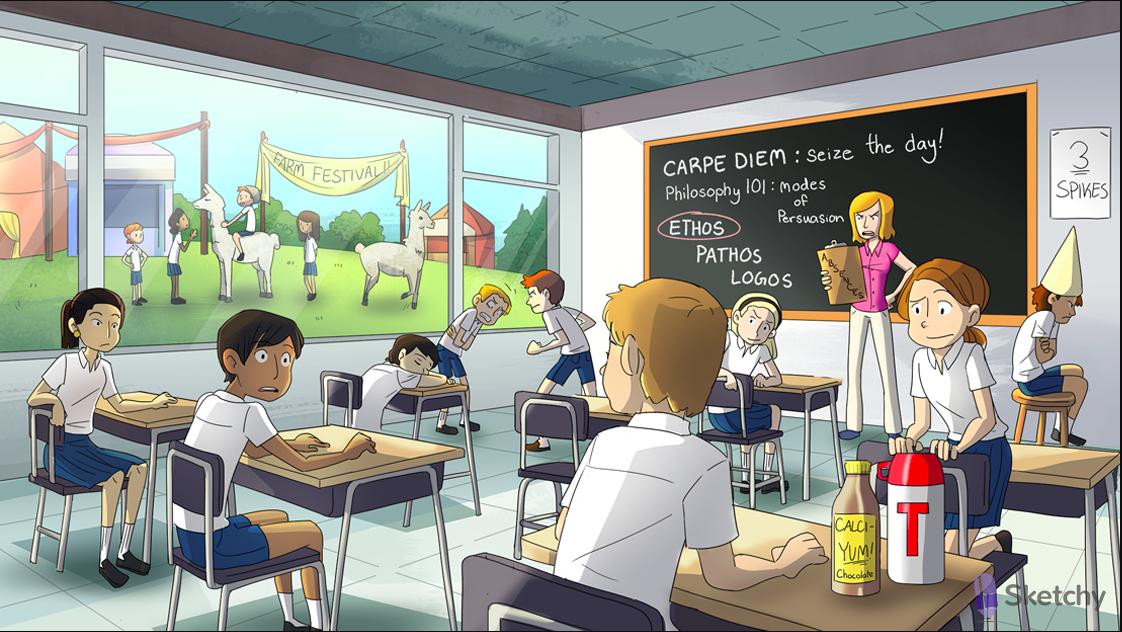
“Seize the day”: antiepileptic therapy for absence seizures (e.g. ethosuximide)
“Absences”: absence seizure (a type of generalized seizure)
Inattentive student: absence seizures are characterized by sudden momentary lapse in awareness accompanied by staring, blinking, or clonic jerks
“3 spikes”: absence seizure manifest as 3 Hz spike wave complexes on EEG

“Ethos”: ethosuximide (a narrow spectrum anti-epileptic drug used to treat absence seizures)
Closed Calci-Yum chocolate: ethosuximide blocks Ca2+ channels
Closed T-thermos: ethosuximide blocks T-type Ca2+ channels in the thalamus
Punched in stomach: ethosuximide can cause GI distress (e.g. pain, nausea, vomiting)
Sleeping student: ethosuximide can cause lethargy or fatigue
FestiVAL banner: valproate is effective against absence seizures
Llama: lamotrigine is effective against absence seizures
Antipsychotics
Antipsychotics I

Typical post-impressionist: first generation (typical) antipsychotics (FGAs)
Halo: haloperidol (high potency FGA)
“Gazing”: “-azine” suffix of FGAs (e.g. trifluoperazine, fluphenazine, chlorpromazine, thioridazine, phenothiazine)
Trying to fly: trifluoperazine, fluphenazine (high potency FGAs) (greater D2 binding)
“Color theory”: thioridazine (low potency FGA)
“Color-Pro”: chlorpromazine (low potency FGA)

Snapping double rope: FGAs block D2 receptors in the CNS
Extinguished alpha flame: FGAs (low potency>high potency) block alpha-1 receptors
Bee swatter: FGAs (low potency>high potency) block H1 histamine receptors

Blocking positive voices: FGAs treat the positive symptoms of schizophrenia (hallucination, delusion, disorganized thoughts/behavior)
Crazy peak: antipsychotics treat acute psychosis in many conditions (e.g. bipolar)
Agitated peak: antipsychotics (e.g. haloperidol) treat acute agitation or aggression/violence
Marionette: FGAs can be useful for the management of Tourette syndrome

Twisted streamer: FGAs can cause torsades de pointes
Shaking: FGAs can cause lower the seizure threshold
Long tapering flag: FGAs have a long half life (highly lipophilic)
low potency specific:
Antimuscarinic tea party: FGAs (low potency>high potency) block muscarinic receptors → dry mouth, constipation, blurred vision, urinary retention
Passed out: FGAs (low potency>high potency) can cause orthostatic hypotension (a blockade)
Van Gogh’s bed: FGAs (low potency>high potency) can cause sedation (h1 blockade)
Corn Yellow paint: chlorpromazine can cause corneal deposits
Deposits on retinal palette: thioridazine can cause retinal deposits (browning of vision)

Twisted streamer: FGAs can cause torsades de pointes
Shaking: FGAs can cause lower the seizure threshold
Long tapering flag: FGAs have a long half life (highly lipophilic)
high potency specific:
EXTRA pyramid hat on the roof: FGAs (high potency>low potency) cause extrapyramidal symptoms (EPS) (cholinergic dopaminergic unbalance treated with benztropine)
Cocked head: acute dystonia (EPS seen within minutes), sudden onset sustained muscle contraction. Torticolis, ocular gyri crisis (forced elevation of eye), arching of back and neck
Uncomfortable in chair: akathisia (EPS seen within days), restlessness, can't sit still
Cog wheels: drug induced Parkinsonism (EPS seen within weeks), bradykinesia, tremor, masked facies (treat with anti-M)
Sticking out tongue: FGAs (high potency>low potency) can cause tardive dyskinesia (oralfacial dyskinesia)
Elevated milk production: FGAs (high potency>low potency) can cause hyperprolactinemia → galactorrhea, amenorrhea, impotence

“Now More Spicy”: FGAs (high potency>low potency) can cause neuroleptic malignant syndrome (NMS)
Rigidly holding pipe: NMS is characterized by generalized “lead-pipe” rigidity (generalized rigidity)
Crazy, sweaty, and tachycardic: NMS is characterized by altered mental status, fever, autonomic instability
Eaten chicken: NMS is characterized by rhabdomyolysis
Antipsychotics II
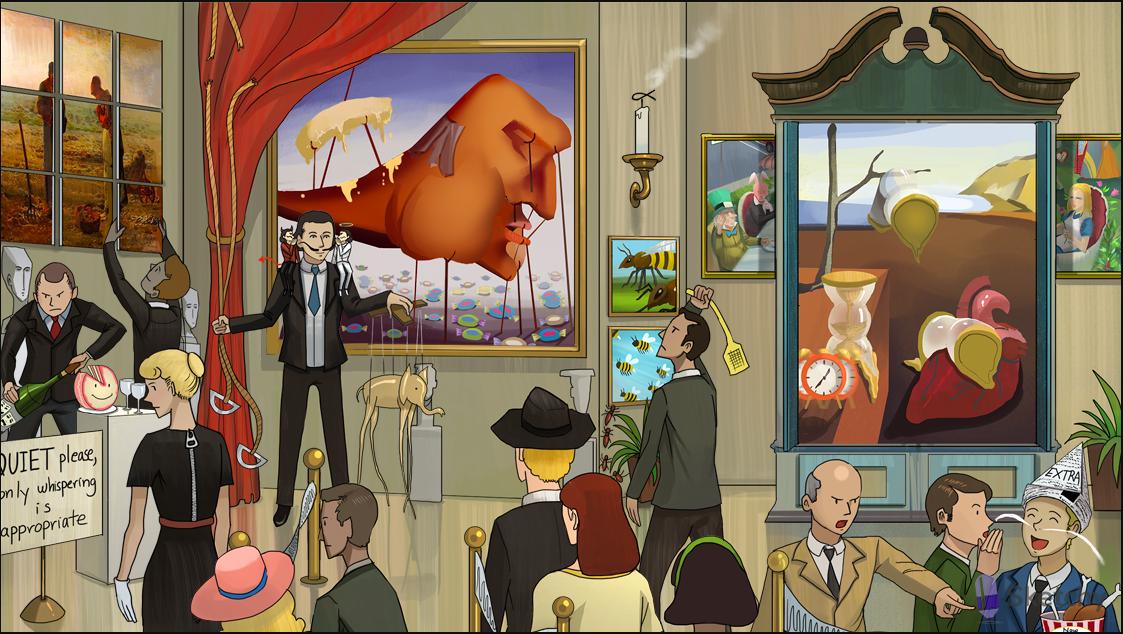
Atypical surrealist: second generation (atypical) antipsychotics (SGAs)
“Quiet please, only whispering is appropriate”: quetiapine, olanzapine, risperidone, aripiprazole (SGAs)
Zipper: ziprasidone (SGA)
closet: clozapine (SGA)

Snapping double rope: SGAs block D2 receptors in the CNS (weak)
Cut smiley cake: SGAs block serotonin receptors (5-HT 2A), lead to release of other NTs (dopamine, NE, Glut, GABA, Ach)

Hearing positive and negative voices: SGAs treat schizophrenia (positive AND negative symptoms)
Happy and sad masks: SGAs can treat depression (treatment resistant)
Resisting opening: treatment resistant depression (not to antidepressant monotherapy)
Obsessively neat: SGAs (e.g. risperidone) can help manage OCD (adjunctive with SSRIs)
Marionette: risperidone can help manage Tourette syndrome

less CNS/extrapyramidal effects, more metabolic effects
Bee swatter: SGAs block H1 histamine receptors→ sedation
Extinguished alpha candle: SGAs block alpha-1 receptors→ orthostatic hypotension (tachycardia)
Antimuscarinic tea party: SGAs (especially clozapine) block muscarinic receptors→ dry mouth, constipation, blurred vision, urinary retention
Obscured tea party: SGAs have lower affinity for muscarinic receptors than FGAs (less antimuscarinic symptoms)
Passed out: SGAs can cause sedation and orthostatic hypotension (block H1 and alpha-1)
Fat face: SGAs (e.g. olanzapine, clozapine) can cause weight gain
Elevated butter: SGAs (e.g. olanzapine, clozapine) can cause dyslipidemia
Bunch of candy: SGAs (e.g. olanzapine, clozapine) can cause hyperglycemia
Melting sand timers: clozapine can cause agranulocytosis
Surreal heart: clozapine can cause myocarditis or cardiomyopathy
Shaking clock: clozapine reduces seizure threshold
EXTRA pyramid hat asked to leave: extrapyramidal symptoms (e.g. acute dystonia, akathisia, parkinsonism) due to D2 blockade (FGA>SGA). Less than 1st gen
Whispering to EXTRA hat: risperidone has the highest risk of causing EPS among the SGAs
Elevated milk release: elevated prolactin levels due to D2 blockade (FGA>SGA)
“Now more spicy”: neuroleptic malignant syndrome (e.g. mental status changes, rigidity, autonomic instability, fever) (FGA>SGA)
Bite out of chicken leg: NMS is associated with rhabdomyolysis
Twisted torsades streamer: SGAs can cause torsade de pointes
Last updated